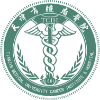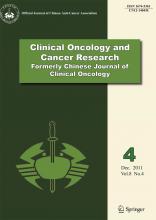Research ArticleResearch Article
Efficacy and Immune Mechanisms of Cetuximab for the Treatment of Metastatic Colorectal Cancer
Hao ZHUANG, Zhen-yi XUE, Lu WANG, Xiao-yan LI, Ning ZHANG and Rong-xin ZHANG
Clinical Oncology and Cancer Research December 2011, 8 (4) 207-214; DOI: https://doi.org/10.1007/s11805-011-0582-8
Hao ZHUANG
1Research Center of Basic Medical Sciences, Tianjin Medical University, Tianjin 300070, China
Zhen-yi XUE
1Research Center of Basic Medical Sciences, Tianjin Medical University, Tianjin 300070, China
Lu WANG
1Research Center of Basic Medical Sciences, Tianjin Medical University, Tianjin 300070, China
Xiao-yan LI
1Research Center of Basic Medical Sciences, Tianjin Medical University, Tianjin 300070, China
Ning ZHANG
1Research Center of Basic Medical Sciences, Tianjin Medical University, Tianjin 300070, China
Rong-xin ZHANG
1Research Center of Basic Medical Sciences, Tianjin Medical University, Tianjin 300070, China
2Department of Immunology, Tianjin Medical University, Tianjin 300070, China

References
- ↵
- Harari PM
- ↵
- Harari PM,
- Allen GW,
- Bonner JA
- ↵Erbitux® (cetuximab) Prescribing Information, ImClone Systems Incorporated and Bristol-Myers Squibb Company, NJ, USA, 2009.
- ↵
- Bonner JA,
- Harari PM,
- Giralt J, et al.
- Bonner JA,
- Harari PM,
- Giralt J, et al.
- Vermorken JB,
- Mesia R,
- Rivera F, et al.
- ↵
- Jonker DJ,
- O’Callaghan CJ,
- Karapetis CS et al.
- ↵
- Van Cutsem E,
- Köhne CH,
- Hitre E, et al.
- ↵
- ↵
- De Roock W,
- Claes B,
- Bernasconi D, et al.
- Linardou H,
- Briasoulis E,
- Dahabreh IJ, et al.
- ↵
- Cunningham D,
- Humbltet Y,
- Siena S, et al.
- ↵
- Wu AA,
- Niparko KJ,
- Pai SI.
- ↵
- Blumenschein GR Jr.,
- Paulus R,
- Curran WJ, et al.
- ↵
- Campoli M,
- Ferris R,
- Ferrone S, et al.
- ↵
- Lurje G,
- Lenz HJ.
- ↵
- Yarden Y.
- ↵
- Wells A.
- Watanabe T,
- Shintani A,
- Nakata M, et al.
- ↵
- Toyoda H,
- Komurasaki T,
- Uchida D et al.
- ↵
- Wiley HS.
- ↵
- Qu CK.
- ↵
- ↵
- Carpenter G,
- Cohen S.
- ↵
- Marshall J.
- ↵
- Nicholson RI,
- Gee JM,
- Harper ME.
- ↵
- Arteaga CL.
- ↵
- ↵
- Mendelsohn J,
- Baselga J.
- ↵
- Kim ES,
- Khuri FR,
- Herbst RS.
- ↵
- ↵
- Mutsaers AJ,
- Francia G,
- Man S, et al.
- ↵
- ↵
- ↵
- Yang X,
- Jia XC,
- Corvalan JR, et al.
- ↵
- Li S,
- Schmitz KR,
- Jeffrey PD, et al.
- ↵
- Lo pez-Albaitero A,
- Ferris RL.
- Pander J,
- Heusinkveld M,
- Van der Straaten T, et al.
- ↵
- ↵
- ↵
- Strome SE,
- Sausville EA,
- Mann D.
- ↵
- Kurai J,
- Chikumi H,
- Hashimoto K, et al.
- ↵
- Correale P,
- Botta C,
- Cusi M, et al.
- ↵
- ↵
- ↵
- Chattopadhyay S,
- Chakraborty NG,
- Mukherji B.
- ↵
- ↵
- Mailliard RB,
- Son YI,
- Redlinger R, et al.
- ↵
- Mailliard RB,
- Alber SM,
- Shen H, et al.
- ↵
- el-Shami K,
- Tirosh B,
- Bar-Haim E, et al.
- ↵
- Gorter A,
- Meri S.
- ↵
- Dechant M,
- Weisner W,
- Berger S, et al.
- ↵
- Saltz LB,
- Meropol NJ,
- Loehrer PJ Sr., et al.
- ↵A phase II trial of FOLFOX6 and cetuximab in the first-line treatment of patients with metastatic colorectal cancer. Clin Colorectal Cancer 2010; 9: 102–107.
- ↵
- Fakih M,
- Vincent M.
- ↵
- ↵
- Van Cutsem E,
- Kohne CH,
- Lang I, et al.
- ↵
- Ocvirk J,
- Brodowicz T,
- Wrba F, et al.
- ↵
- Bokemeyer C,
- Bondarenko I,
- Hartmann JT, et al.
- ↵
- ↵
- Tol J,
- Koopman M,
- Cats A, et al.
- ↵
- Saltz LB,
- Lenz H,
- Hochster H, et al.
- ↵
- Reichert JM,
- Rosensweig CJ,
- Faden LB, et al.
- ↵
- ↵
- Zhang W,
- Gordon M,
- Schultheis AM, et al.
- ↵
- Diepstra A,
- Poppema S,
- Boot M, et al.
- ↵
- Lin A,
- Yan WH,
- Xu HH, et al.
- ↵
- ↵
- ↵
- ↵
- Bokemeyer C,
- Bondarenko I,
- Hartmann JT, et al.
- ↵
- Van Cutsem E,
- Lang I,
- D’haens G, et al.
- Khambata-Ford S,
- Garrett CR,
- Meropol NJ, et al.
- ↵
- Amado RG,
- Wolf M,
- Peeters M, et al.
- ↵
- Li-Xin Qiu,
- Chen Mao,
- Jian Zhang, et al.
- ↵
- Scartozzi M,
- Mandolesi A,
- Giampieri R, et al.
- Inno A,
- Salvatore MD,
- Cenci T, et al.
- De Roock W,
- Jonker DJ,
- Di Nicolantonio F, et al.
- Oden-Gangloff A,
- Di Fiore F,
- Bibeau F, et al.
- ↵
- Hawkes E,
- Cunningham D.
- ↵
- ↵
- ↵
In this issue
Efficacy and Immune Mechanisms of Cetuximab for the Treatment of Metastatic Colorectal Cancer
Hao ZHUANG, Zhen-yi XUE, Lu WANG, Xiao-yan LI, Ning ZHANG, Rong-xin ZHANG
Clinical Oncology and Cancer Research Dec 2011, 8 (4) 207-214; DOI: 10.1007/s11805-011-0582-8
Jump to section
Related Articles
- No related articles found.
Cited By...
- No citing articles found.
More in this TOC Section
Similar Articles
Keywords
- colorectal cancer
- cetuximab
- epidermal growth factor receptor
- immune mechanisms
- prognostic marker
- EGFR, epidermal growth factor receptor
- CDC, complement-dependent cytotoxicity
- mCRC, metastatic colorectal cancer
- mAb, monoclonal antibody
- ADCC, antibody-dependent cellular cytotoxicity
- TA, tumor antigen
- EGF, epidermal growth factor
- NK, natural killer (cells)
- DC, dendritic cells
- CTL, cytotoxic lymphocyte
- BSC, best supportive care
- OS, overall survival
- PFS, progression-free survival
- RR, response rate
- APC, antigen-presenting cell
- HLA, human leukocyte antigen










